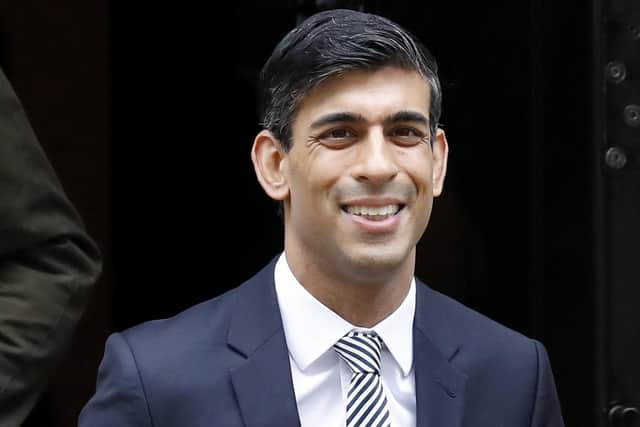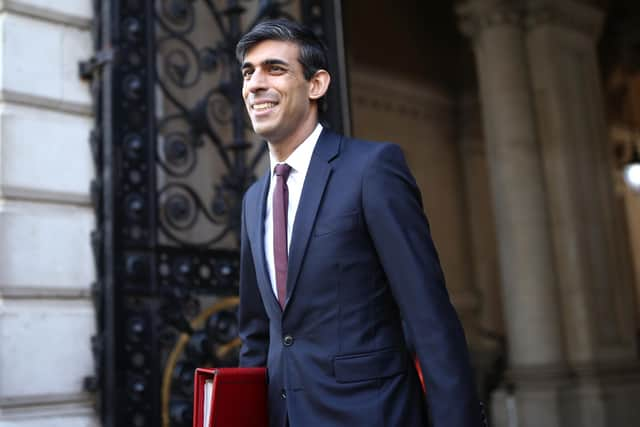Prime Minister Rishi Sunak: A politician of contradictions and inconsistencies
It told of how his maternal grandmother, Sraksha, short on money, but full of “hope for a better life”, took a one-way flight to Britain from Tanzania, and toiled for a year to allow her family to follow in her footsteps.
Even accounting for Mr Sunak’s relatively short career in politics, it is an account he and his supporters have returned to time and again, hailing it as evidence of the modern and diverse new generation of Conservative politicians.
Advertisement
Hide AdAdvertisement
Hide AdBut in many ways, Mr Sunak’s ascent to power tells another, even more familiar story; that of a privileged young man educated at prestigious fee-paying schools and Oxbridge, who embarked on a short career in investment banking before entering politics as a multi-millionaire.
The 42 year-old, the son of a GP and a pharmacist, has only been an MP for seven years, but his rapid rise to 10 Downing Street represents the defining chapter to date in both of those competing narratives.
He becomes the first person of colour to become prime minister, the youngest holder of the office since William Pitt the Younger, and the first practising Hindu. He is also the richest prime minister since Archibald Primrose, the 5th Earl of Rosebery, who married into the Rothschild family.
That duality may prove helpful to Mr Sunak as he becomes Britain’s third prime minister in the space of just seven chaotic weeks. On the one hand, he must contend with the highest level of government debt in nearly 60 years; on the other, he must find a way of repairing an economy that has become an international laughing stock.
That is to say nothing of how he intends to unite a fractured party in which he is regarded by many as a divisive figure, thanks to his part in the demise of Boris Johnson.


The question of how Mr Sunak approaches such daunting tasks is inseparable from a question that has long been asked of him – exactly what kind of Conservative is he?
The earliest clues provided evidence of a telling Euroscepticism when he wrote an article in his school magazine bemoaning “worryingly pro-European” New Labour rhetoric. He has maintained that stance ever since, becoming one of the most committed Brexiteers in his party.
In recent years, however, he has stood apart from the most fervent band of Tory Brexit supporters, and drew the ire of those on the right of the party when he conceded in March it was “always inevitable” the UK’s exit from the EU would have an impact on its trade with the rest of the continent.
Advertisement
Hide AdAdvertisement
Hide AdSuch contradictions also surround his economic policy. While he is an affirmed champion of the free market, he also oversaw the single biggest state intervention in British peacetime history when, just months after becoming chancellor, he found himself forced to navigate the unprecedented turmoil sparked by the pandemic.


If that intervention was deemed to be unavoidable, Mr Sunak’s recent pitch to Tory MPs and members also revealed inconsistencies.
During his failed leadership bid in the summer, he promised a “return to traditional Conservative economic values” – shorthand for fiscal prudence – and warned against unsustainable tax cut pledges made in service of electoral success.
Yet little over a fortnight later, as he trailed Liz Truss in the polls, he promised to cut the basic rate of income tax and scrap VAT on household fuel bills for a year.
Such flip-flopping dented Mr Sunak’s credibility and, ultimately, put paid to his hopes of becoming leader. Now that he has seized a second chance, he will have an opportunity to set out what he stands for once and for all.
At the very least, the avowed Star Wars fan is seen by many in his party as someone who can bring stability and competency – values that have been conspicuous by their absence in recent weeks. That view is increasingly shared by those who backed Ms Truss in the summer.
David Mundell, the former Scottish secretary, said Mr Sunak was “the only viable candidate to stabilise the situation,” adding: “Rishi Sunak is best placed to do that in the interests of the country. I hope he will bring the professionalism to the office necessary to carry it out.”
Such endorsements, though welcome, are hardly ringing, and show Mr Sunak’s premiership will be far from straightforward.
Advertisement
Hide AdAdvertisement
Hide AdHe also enters Downing Street with questions yet to be answered about his family’s tax affairs – an issue that will doubtless play into the hands of Labour at the next general election.
It emerged earlier this year that his wife, Akshata Murty, a multi-millionaire who receives more than £11 million in annual dividends from her stake in Infosys, an Indian IT firm, claims non-domicile status.
The arrangement allowed her to save millions of pounds in tax on the dividends, and put considerable pressure on Mr Sunak during his time as chancellor.
Ms Murty has since said she will be paying UK tax on her overseas earnings. But now he is in line for the top job in British politics, it would be naive to suppose the scrutiny of Mr Sunak’s family wealth is over, especially in the midst of a deepening cost-of-living crisis.
“We’ve had enough of division,” Mr Sunak said in his July campaign video. “Politics at its best is a unifying endeavour, and I have spent my career bringing people together because that is the only way to succeed.”
It is a fine ambition. Now, it is about to be tested like never before.
Comments
Want to join the conversation? Please or to comment on this article.